Altar: The town where migrants shop for a perilous journey
- Published
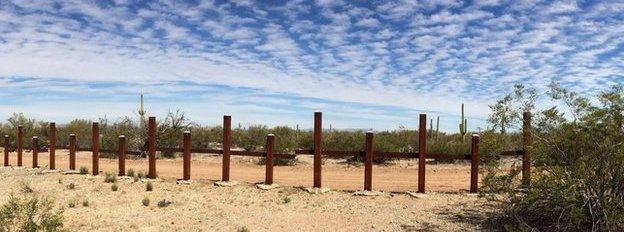
The Sonoran Desert claims the lives of some migrants who cross into the US on foot
In a Mexican border town, the shops are stocked for one thing - to equip migrants for the last leg of a long and sometimes fatal journey.
From early morning, people start to congregate in the main plaza in Altar.
Under a grey sky, the sun not yet high enough to warm their backs, pockets of men and women gather to share a coffee, a quesadilla or a cigarette.
At first glance they seem like any other rural workers in northern Mexico.
The men wear caps and jeans, beaten-looking trainers and boots.
The women are dressed like the men. But Altar is unlike anywhere else in Mexico.
Amid the furtive looks and conspiratorial chats, these people are on the move, plotting their route north.
Illegal immigration is a thriving business in Altar - with shops openly selling supplies for migrants crossing the desert
They have arrived from across Mexico and Central America, often enduring tremendous hardship to get this far.
Now they stand, huddled in small groups, barely 100 kilometres (62 miles) from their ultimate destination - the border with the United States.
Some are looking for a coyote, a guide who will take them on the most dangerous leg through the desert.
The first man I spoke to looked bewildered - days earlier he had been deported from the US where he had lived for 20 years, thrown out for driving without a licence.
Inside the church at the centre of the square, there is a "Prayer to the Migrant Brothers" on the wall.
"Jesus, take pity on them and protect them" it reads, "as they are mistreated and humiliated on their path."
A young man and his sister are on their knees beneath those words, offering a few prayers of their own to the Virgin of Guadalupe, Mexico's patron saint.
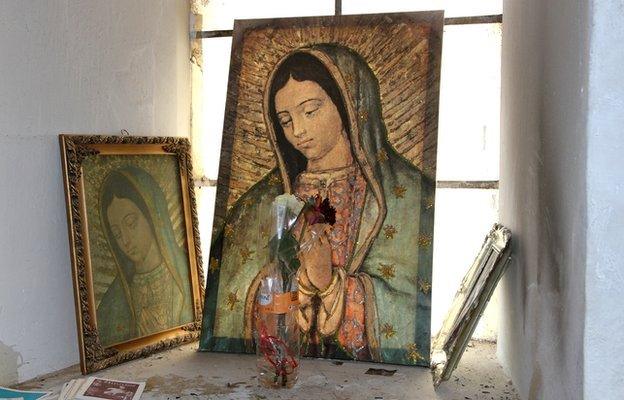
Migrants often carry her image to protect them through the Sonoran Desert.
"Altar has become a reference point for crossing migrants. We can't stand by with our arms folded in the face of such suffering," says Padre Prisciliano Peraza, the local parish priest.
Wearing a stetson hat and cowboy boots rather than a dog collar, he doesn't look much like your average Mexican man of the cloth.
An outspoken advocate for migrant rights, he once crossed the desert himself in solidarity with his undocumented flock.
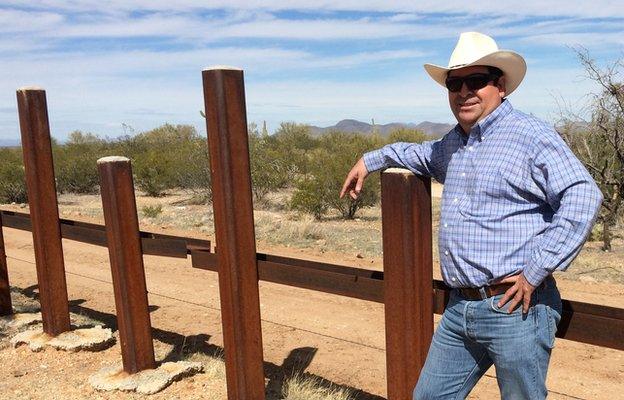
Staunch defender of migrants' rights, Padre Prisciliano Peraza does not look like a typical Mexican priest
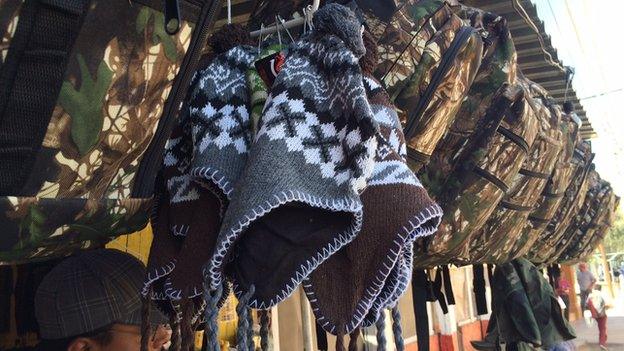
The economy of Altar depends on selling trekking goods to migrants heading to the US
"We should be very thankful for the migrants, we should protect them," he says stabbing a finger in the air.
"We should embrace and celebrate them because 90% of our economy depends on what our migrant brothers spend here," he adds.
A short walk around the town is enough to see what he means.
Shops line the square selling everything the prospective border-crosser could need.
There are T-shirts, trousers and long-sleeved hooded tops, all in desert camouflage to try to fool the border patrols.
There are rucksacks, again camouflaged, in which they can carry their thin blankets and meagre supplies of tinned food.
There are water bottles, painted black so they don't reflect the sun when the border patrol guards look through their binoculars.
And, strangely enough, there are carpet slippers.
The shop owner, Victor, demonstrates how the elasticised slippers fit over the migrant's shoes so they don't leave tracks in the sand.
Not exactly the most practical footwear for a five-day trek through the desert, but this journey is about stealth rather than comfort.
"The rucksacks and the carpet slippers are my best sellers," Victor confides.
The next morning, still dark outside, the padre took us to the border fence.
It's a three-hour journey along dirt roads through territory run - we are reliably informed by graffiti on a burnt-out shack - by the Sinaloa drug cartel.
"Imagine doing this trip in those vans," the padre yells above the clatter of his truck, referring to lines of mini-vans we'd seen back in Altar, their seats ripped out and replaced with thin metal benches to cram in more migrants.
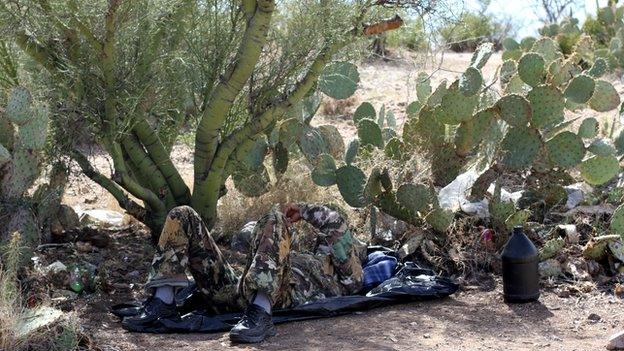
We passed a number of shady checkpoints.
They are run by men with guns. Cartel members - or people traffickers - or some hybrid of the two.
Fortunately the padre's fame in these parts meant our passage was waved through without question.
At the border itself, we climbed a small ridge, and there the migrants were, waiting to cross.
Resting in makeshift shelters of plastic sheeting and cactus to protect themselves from the punishing heat and fierce desert winds, the same men and women from the plaza in Altar were now dressed from head-to-toe in camouflage wear.
"You can see Jesus Christ walking among us," says the padre before quoting Matthew verse 35: "I was hungry and you gave me something to eat, I was thirsty and you gave me something to drink."
Everyone had a similar story - life was too tough in Guatemala or Honduras or rural Mexico to make ends meet. Or they were trying to get back to their families in the US after having been deported.
One woman had her three-year-old child on her hip. Another carried a baby.
We stood looking into the US, the land of opportunity tantalisingly close, the migrants already thirsty, dirty and exhausted.
Staring at the inhospitable desert shimmering in front of them, they knew the hardest part of their journey was yet to come.
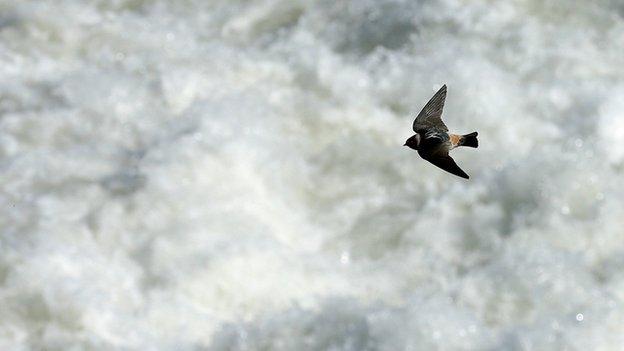
How to listen to From Our Own Correspondent, external:
BBC Radio 4: Saturdays at 11:30 and some Thursdays at 11:00
Listen online or download the podcast.
BBC World Service: Short editions Monday-Friday - see World Service programme schedule.
Follow @BBCNewsMagazine, external on Twitter and on Facebook, external